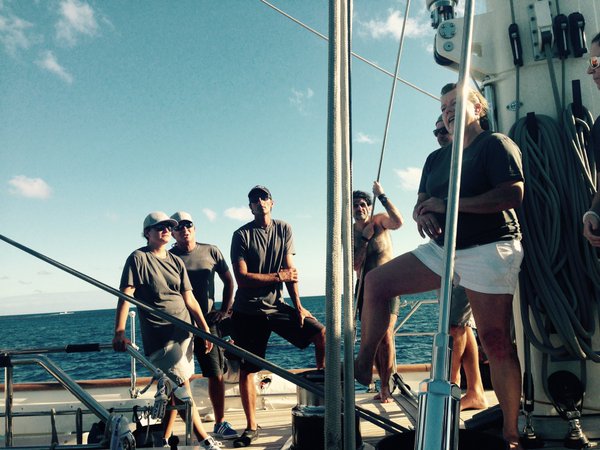Dealing with the aftermath
What procedures are in place for crew to help them understand and cope if a traumatic incident occurs on a yacht?
The yachting industry continues to work hard to ensure crewmembers are in as safe an environment as possible. Regulations, stringent safety checks and improvements in technology all contribute to fewer accidents in day-to-day life. However, no job is perfect and accidents still do occur. Recent high-profile tragic incidents aboard Ocean Victory and Germania Nova highlight that there is still a risk of death for those on yachts.
The Crew Report regularly focuses on the significance of safety features and training, which are hugely important in protecting both crew and guests from tragic accidents; there are always lessons to be learned from these occurrences. But after the media coverage and investigations into the accident are over, what happens to the crew who were involved in the trauma? The focus has been on the individual who was hurt or even killed, and rightly so, but those who were witnesses can also be fundamentally affected. What is the yachting industry doing to assist those who have been a part of a traumatic experience?
Traumatic incidents on board can vary greatly, from a crewmember or guest dying to a physical altercation or an accident that results in an injury. The severity of each incident may differ, but the possible effects of trauma should never be underestimated. “Because of the typically tight bonds between members of a yacht crew, trauma can affect crewmembers who were not directly involved in the incident every bit as severely as those who were,” begins Captain Richard Le Quesne, Professional Yachting Association (PYA) councillor and board member.
As many crew will testify, the familial atmosphere on board is one of the most attractive reasons to work in the industry; this differentiates it from a normal working environment and, as a result, means that witnessing a traumatic incident or death of a colleague may affect individuals on a deeper level. Also, if an incident takes place on the vessel, where crew both live and work, there is a constant reminder of what had happened. As one chief stewardess explains, “Working day to day where one of your friends had died … it would be unbearable, you could not escape from it.”
“Because of the typically tight bonds between members of a yacht crew, trauma can affect crewmembers who were not directly involved in the incident every bit as severely as those who were.”
Le Quesne adds, “In the event that, following a significant incident, the PYA is asked to assist, we would advise that the vessel’s shoreside management (if any) and the insurers should make arrangements to provide professional counselling appropriate to the language and culture of the crewmembers. In the event that this counselling was not being provided, we would try to help the captain make the appropriate arrangements.”
One captain, speaking to The Crew Report, raised the important point that there is a substantial amount of training available for medical emergencies and injuries if they occur on board, including a follow-up checklist to ensure that any crewmember is still able to carry out their duties. These are also logged as part of an accident report. There are, however, no protocols for dealing with a death and any subsequent emotional care for the surviving crew.
Ultimately, it is beneficial for an owner to ensure that their crew is coping, both emotionally and physically. As one captain explains, “I think crew welfare is incredibly important. If you don’t pay it enough attention it can hurt a yacht in so many ways; [with] unhappy crew, maintenance slips, profile and image can decrease, crew can leave the industry prematurely, and longevity is so important for an owner.”
In the period following an incident, the captain admits there is little official guidance on working with crew through a traumatic time, and it is mostly up to each captain to use their emotional intelligence to help. “My philosophy as a captain is to be as open and honest with the crew as possible,” he adds. “The idea is that they can come to me for advice whether it be about their careers, a life matter or issue. The treatment is similar for all – spotting a problem before it’s too late, offering the chance to share a problem. Giving advice where possible, or seeking advice to better advise the crewmember.”
As in any area of life, dealing with trauma is truly an individual process. What the industry must recognise is the importance of providing crew with the space to understand and cope with any incidents that occur on a vessel. If they are given the appropriate support, the trauma of a death or serious injury will be dealt with sensitively, allowing those involved to move forward.
This article appeared in full in The Crew Report issue 84. Click here to see if you are eligible for a complimentary subscription.
Image credit: Bryony McCabe
NEW: Sign up for SuperyachtNewsweek!
Get the latest weekly news, in-depth reports, intelligence, and strategic insights, delivered directly from The Superyacht Group's editors and market analysts.
Stay at the forefront of the superyacht industry with SuperyachtNewsweek
Click here to become part of The Superyacht Group community, and join us in our mission to make this industry accessible to all, and prosperous for the long-term. We are offering access to the superyacht industry’s most comprehensive and longstanding archive of business-critical information, as well as a comprehensive, real-time superyacht fleet database, for just £10 per month, because we are One Industry with One Mission. Sign up here.
NEW: Sign up for
SuperyachtNewsweek!
Get the latest weekly news, in-depth reports, intelligence, and strategic insights, delivered directly from The Superyacht Group's editors and market analysts.
Stay at the forefront of the superyacht industry with SuperyachtNewsweek




